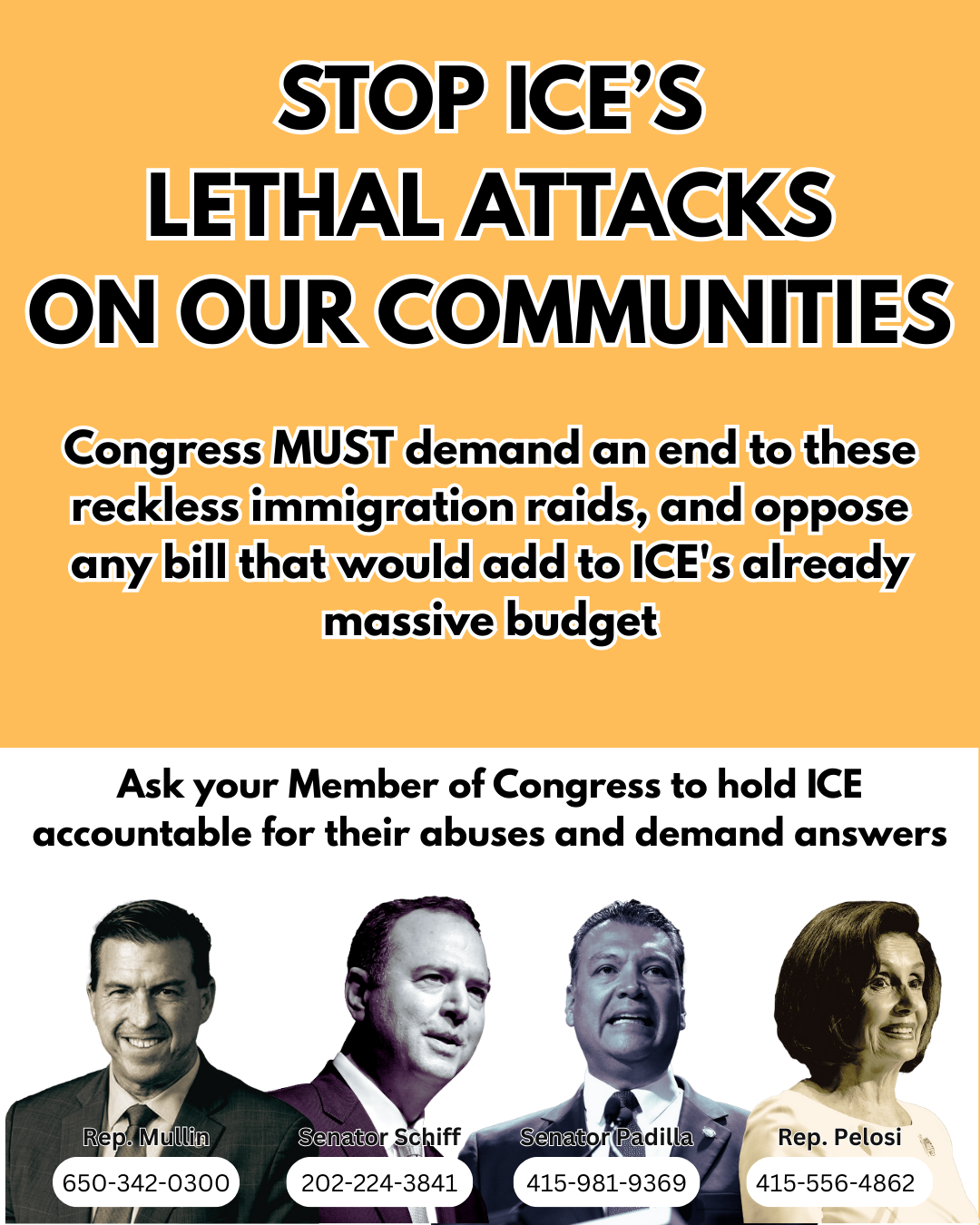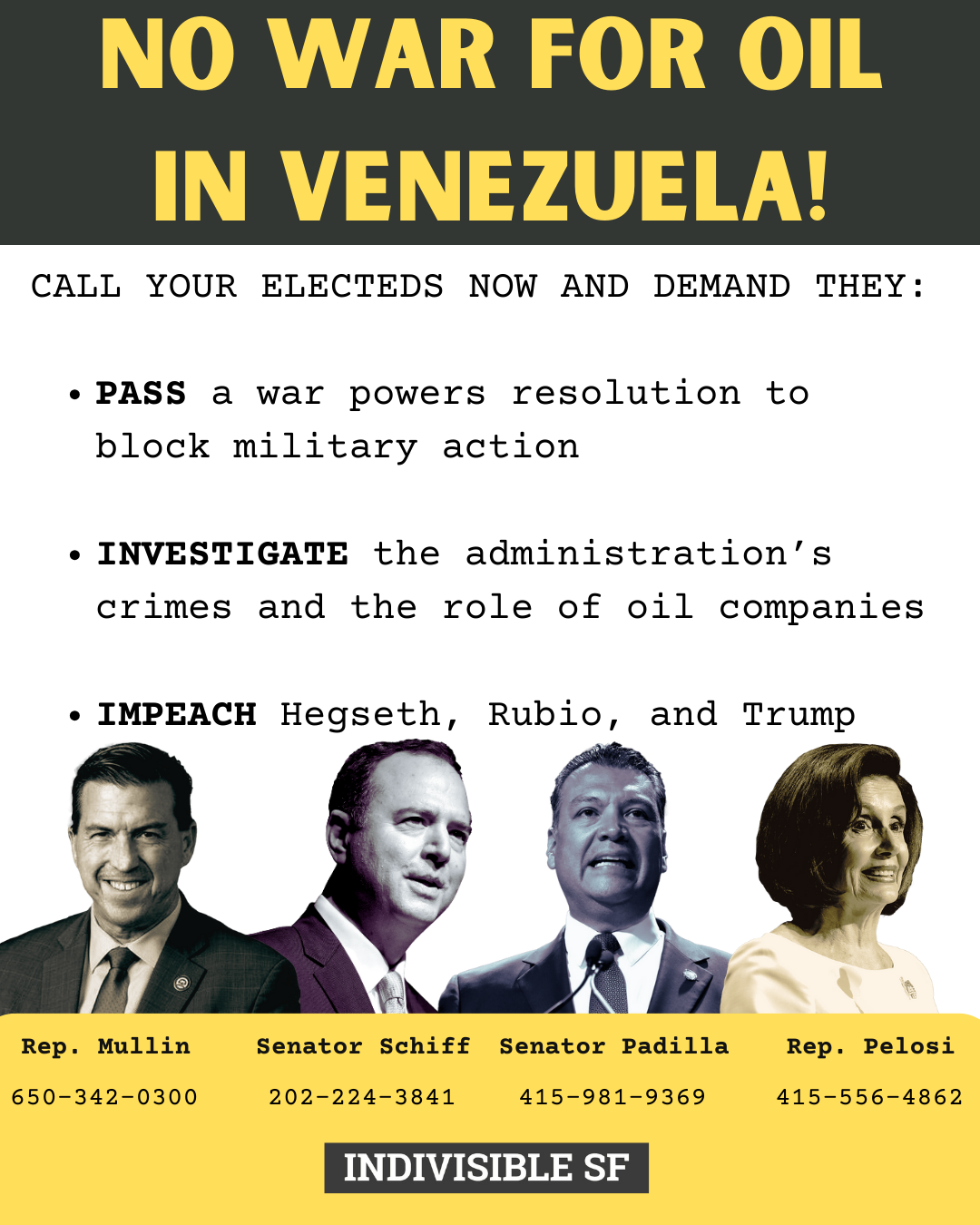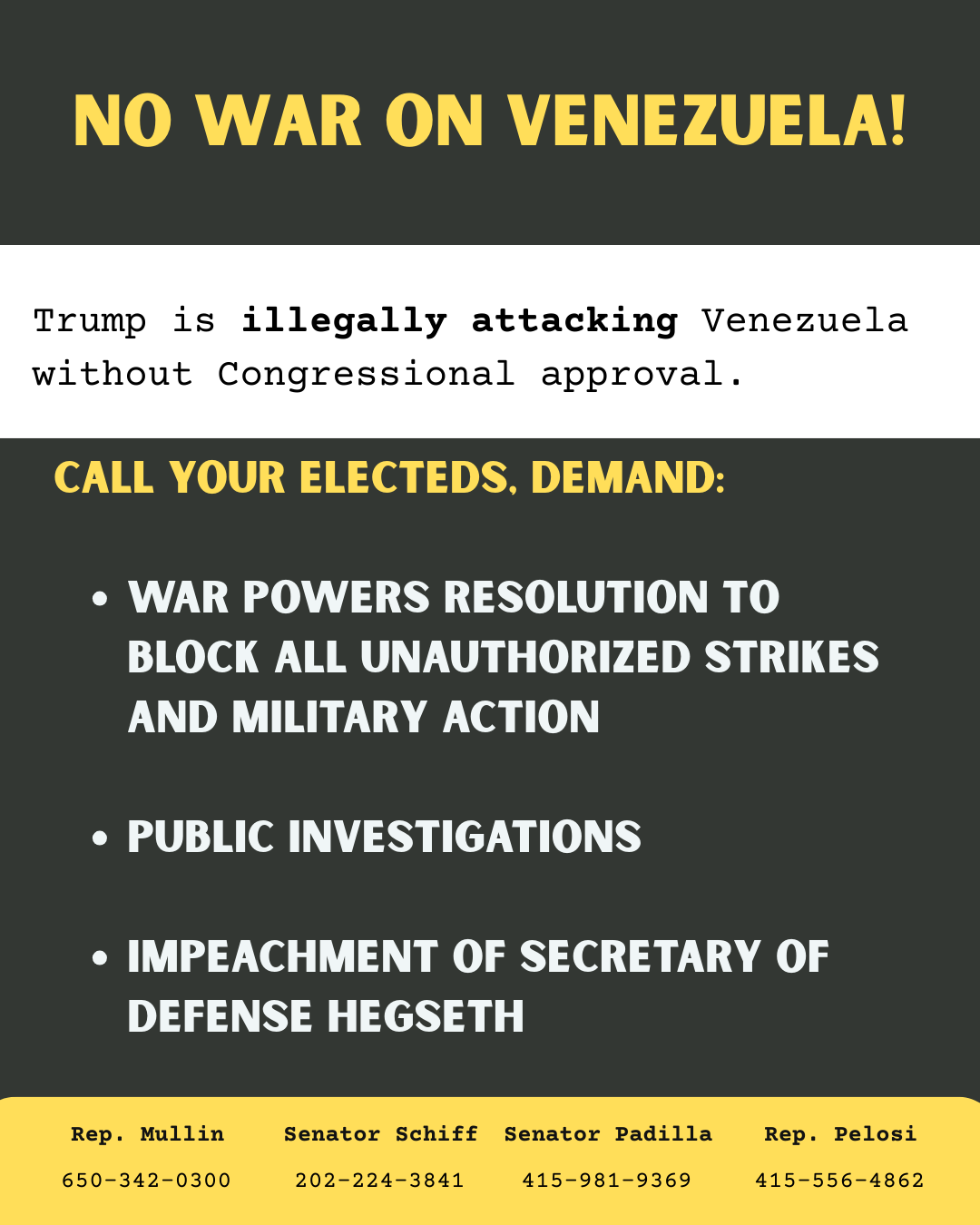Tell your MoCs to oppose NAFTA 2.0!
Senator Dianne Feinstein
SF Office: (415) 393-0707
DC Office: (202) 224-3841
LA Office: (310) 914-7300
Fresno Office: (559) 485-7430
San Diego Office: (619) 231-9712
If you can't get through to one office, try another. There is no benefit to calling one office over another. Leaving a voicemail is as good as reaching a live person. Hate the phone? Resistbot is your friend.
Senator Kamala Harris
SF Office: (415) 981-9369
DC Office: (202) 224-3553
Sacramento Office: (916) 448-2787
LA Office: (213) 894-5000
San Diego Office: (619) 239-3884
Call the SF office first, but try the other offices if you can’t get through. If you can’t get a live person, leave a voicemail and also send a follow-up email written in your own words. Hate the phone? Resistbot is your friend.
Note: only one of the following two Congresswomen represents you. To find out which one, click here.
Speaker Nancy Pelosi
SF Office: (415) 556-4862
DC Office: (202) 225-4965
Call the SF office first, but try the DC office if you can’t get through. If you get voicemail, hang up and try a few more times to talk to a real person. Don’t give up! Short direct messages are most effective. Hate the phone? Resistbot is your friend.
Rep. Jackie Speier
San Mateo Office: (650) 342-0300
DC Office: (202) 225-3531
Keep calling if you don’t get through. Voicemails are logged daily into a central report across offices. Hate the phone? Resistbot is your friend.
Call Script
My name is __________. I am a constituent, and my zip code is _______. I am a member of Indivisible SF.
I ask the Representative/Senator to please oppose Congressional ratification of the United States-Mexico-Canada Agreement, or USMCA, also known as NAFTA 2.0. This is the wrong policy both for the U.S. and for its neighbors.
We cannot trust any trade agreement that excluded labor representatives, consumer advocates, and environmental defenders from the language-drafting process. Too many unions in Mexico are either totally controlled by the employers or are gangster run shams while honest labor leaders are routinely disappeared or assassinated with impunity. Without strong and effective enforcement and sanction provisions, all claims that USMCA will protect Mexican labor rights are false.
In this era of ruthless price-gouging by Big Pharma, it is outrageous that NAFTA 2.0 contains provisions allowing them to continue over-charging American consumers for drugs.
The original NAFTA's anti-democratic Investor State Dispute System (ISDS)—already extended in the most recent budget Continuing Resolution—allows giant corporations to unilaterally overturn consumer, environment, and safety laws. NAFTA 2.0 makes no revision to this system.
USMCA locks in corporate copyright rules without an essential Fair Use provision, undercuts the concept of net neutrality, and makes it easier for big business to circumvent privacy safeguards and abuse our personal data. Worse yet, it includes a tech liability shield that will make it almost impossible for Congress to take any future action to regulate big tech firms’ role in spreading misinformation and disinformation.
It's time for Democrats to stand up for Main Street and stop selling their souls to Wall Street. No NAFTA 2.0!
Background
NAFTA 2.0 is officially known as the United States-Mexico-Canada Agreement, or USMCA, and it was entirely drafted—in secret—by corporate lawyers and lobbyists and government bureaucrats who were themselves corporate functionaries in the past (or know they will be in the future).
The negotiations for it included corporate representatives but excluded representatives of labor, environment, consumers, and local government. Clear assumption that the only interests that need be taken into account are those of corporations and national governments (tariffs).
The fruits of poisoned processes should not be eaten.
Since the current back-room negotiations are being conducted in secret, the only real information available to us the public is the official USMCA language that has already been ratified by Mexico. That language has a wide range of problems, including:
Investor-State Dispute Settlement (ISDS).
Non-discriminatory health, safety, labor, and environmental laws & regulations by democratically elected government entities are still subject to ISDS overrule.
What is difference between NAFTA 1.0 & USMCA re ISDS? NAFTA 2.0 supporters claim that NAFTA 1.0 problems were fixed, but the language of both seem similar.
Dispute resolution panels under NAFTA 1.0 were entirely composed of corporate lawyers & trade bureaucrats. No one from labor, environment, consumers, or local government were allowed to participate and there’s nothing in the 2.0 language to change that.
Enforceable labor standards (the core of “off-shoring” for profit) are inadequate.
Commitment to ILO standards is sabotaged and weakened by footnotes.
No actual minimum wage is specified or required (only that on can be set by labor laws)
No mitigation of the direct financial incentives for outsourcing contained in the Republican tax cut act.
No requirement that labor standards actually be in effect and enforced before NAFTA 2.0 goes into effect.
The anti-discrimination clause is undercut by a “considers appropriate” qualifier.
Murder of honest labor leaders is not treated as a violation because of “sustained or recurring” qualifier.
Government workers and contractors are excluded from labor standards due to “affecting trade or investment” qualifier.
Enforceable environmental standards and rules are lacking.
Climate change, global warming, and the Paris Agreement are not mentioned, so they’re not valid basis for standards or enforcement.
No assurance that food labeling laws (including country-of-origin labeling) are not a trade violation.
Contains provisions making it easier for corporations to challenge climate and environment regulations as treaty violations which is why American Petroleum Institute loves the new agreement.
Does not prohibit moving polluting operations to a nation with weaker environment rules. That used to be Mexico but under Trump/Republicans it might soon be US.
Congress must tie USMCA approval to approval of Paris Agreement.
Expansion of international corporate copyright & patent powers.
Patent expansion keeps our medicines prices high and imposes higher costs on Mexico and Canada (e.g. 10-year monopoly on “biologicals” vs Mexico’s current 5 year).
Locks in corporate copyrights without an essential “Fair Use” provision.
Restricts data privacy safeguards in all three countries.
Says nothing about net neutrality.
Inserts a tech liability shield in an international agreement which will make it almost impossible for Congress to take any future action to regulate big tech firms’ role in spreading election-related or political misinformation and disinformation.
Resources
Investor-State Dispute Settlement (ISDS): Extraordinary Corporate Power in “Trade” Deals, Public Citizen
Why NAFTA’s 2.0 current labor provisions fall short, EPI 3/28/19
AFL-CIO Statement on NAFTA 2.0, 3/14/19
Trade Must Build an Inclusive Economy for All, AFL-CIO 3/14/19
1,000+ Civil Society Groups Outline Shared NAFTA Demands Citizens Trade Campaign, 3/21/18
Civil Society Priorities in the NAFTA Renegotiation, Citizens Trade Campaign, 10/18
Trump’s NAFTA 2.0 Puts Big Pharma First, America Second , New York Magazine, 3/29/19
NAFTA 2.0 Would Lock In High Medicine Prices, Citizens Trade Campaign 3/28/19
How the USMCA falls short on digital trade, data protection and privacy, Washington Post, 10/3/18
Why Trump Still Can’t Get USMCA Through Congress, Foreign Policy 10/23/19







